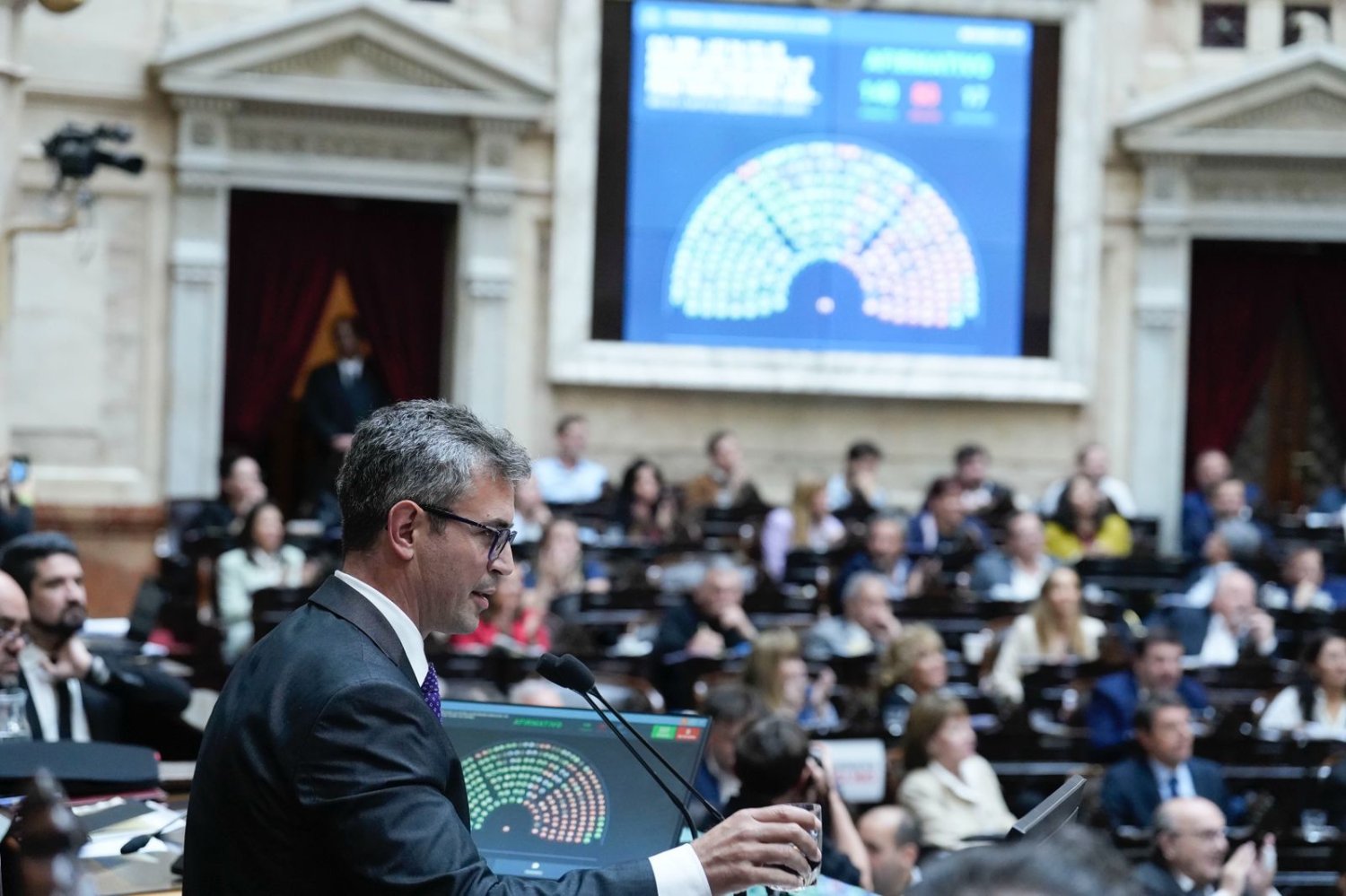
In a day full of tension in the Chamber of Deputies that was heading towards another defeat for the ruling party, Milei will be able to breathe for a few more days because he momentarily prevented the law that was going to limit the use of the DNU from being sanctioned.
Although the vote in general was in favor with 140 votes, 80 against and 17 abstentions, the problem appeared in the vote in particular. It was for eArticle 3 that came out negative must return to the Senate because the rejection of an article is considered a modification.
He article 3 was the one who stated that Congress has 90 days to rule on a DNU and that both chambers must validate it. It came out with 127 affirmative votes and since it is a law that regulates powers of the National Constitution, it requires an absolute majority, that is, 129. It was missing 2 votes. The government managed to buy time with the help of 14 deputies who changed their vote to help the government. Key were 3 candidates from the Civic Coalition who abstained (Lopez, Borrego and Campagnoli), 1 from Unión por la Patria (Bertoldi) and Manes from Democracia para Siempre. But they were not the only ones: there were also 3 others from the PRO who changed their vote (Baldassi, Brambilla and González), Karina Banfi and Quetglas from the UCR, and 4 of the former libertarians now in Coherencia (Zago, Falcone, D’Alessandro and González).
In the general vote They were in favor of limiting the DNU Union for the Homeland, the Left Front, the Civic Coalition and the majority of the Federal Encounter and Democracy Forever blocs. Also the former libertarians grouped in Coherencia and Julio Cobos of the UCR. Against it were La Libertad Avanza, the PRO and the Santacruceños of Governor Vidal. Almost all of the UCR, Federal Innovation that responds to the governors of Misiones, Salta and Rio Negro, López Murphy, Giorgi of Democracy for Always (of Governor Pullaro) and Avila of Governor Torres, counted for the abstention.
In this way, the “United Provinces” alliance that brings together several governors played in favor of Javier Milei. Some in the vote in general and others helping to ensure that it is not sanctioned yet. On this occasion, only the people of Córdoba from Llaryora voted as opponents.
The Milei government buys time and momentarily prevents Law No. 26,122 from being modified which regulated in 2006 the use of DNU (decrees of necessity and urgency) and delegated decrees (due to delegated powers given by Congress to the Executive Branch) enabled by the National Constitution. Authored by Cristina Fernández de Kirchner, this regulation has until now made it easier for a president to govern by decree than to sanction laws of Congress.
Currently, a DNU can remain valid despite the fact that one of the Chambers has rejected it (as in the case of meda DNU 70/2023), if only one of the Chambers validates it (such as the DNU for the new indebtedness with the IMF), and it is also maintained without Congress ruling on its validity or invalidity. The path to passing a law is more difficult because it requires the approval of both chambers.
The change in the law that will now have to return to the Senate seeks to reverse the logic of operation current. It proposes that Congress be obliged to pronounce itself within a period of 90 days and if it does not pronounce itself, the DNU falls. That is to say, it can no longer play with silence so that the decrees remain valid in reality. Furthermore, to validate a DNU, endorsement in both Chambers would be necessary, and with the rejection of just one it would be enough for it to fall.
In a country where political fragmentation that is expressed today in Congress is here to stay, the DNU tool becomes central for all the spaces that intend to occupy the chair of the Casa Rosada. That is why the Milei government does not want this change, and the majority of the blocks have been very elusive in the debate, with many who ended up helping the ruling party to buy time.
In the immediate future, Milei needs the DNU like the air. If it is sanctioned, his will is to veto it to reinforce monarchical power and continue skipping everything Congress can. The contradiction this time is that more than one opponent is viewing a presidential veto with great affection, despite having voted in favor of the changes this Wednesday. It is no coincidence that almost all the blocks have contributed something so that the government buys time. It was also striking that very few representatives of Unión por la Patria defended the change to the regulation of the DNU in the session.
The paradox of the debate is that La Libertad Avanza, the PRO and part of the UCR were left defending Cristina Fernández Kirchner’s law. From Unión por la Patria they put forward a curious argument: the law was good during their governments because it was well used, but with Milei they are about to change it.
Nicolás MayorazFrom the ruling party, they maintained that limiting the DNU with this change seeks to “destabilize the government, generating the greatest legal insecurity they can.” He argued that the urgency of the DNU is “a political assessment, not a legal one,” justifying megadecrees such as DNU 70/2023 from his ideological positioning. Silvana Giudici of the PRO She swore that she was always critical of the 2006 DNU law and that she always wanted to change it, but now she does not agree, “it should be sanctioned without taking advantage of the situation of any political party,” she said. Rodrigo de Loredo from the UCR He asked “that this regulation be improved” but that it be applied “only by December 10, 2027”, when Milei’s mandate ends.
On the side of Union for the Homeland there were few voices defending the change in the law by Cristina Fernández. Mónica Litz For example, he said, “Are the DNUs wrong? No way. It’s not the instrument, it’s how it has been used.” In the same sense, he later completed “Not all DNUs were equal. There are DNUs that expanded rights and others that came to destroy the state.” Also Juan Manuel Pedrini asked “Why is this law necessary?” and the response was “because Milei assumed, La Libertad Avanza assumed.” It was striking that the closing of the Unión por la Patria speeches were given by two people from Catamarca who respond to Governor Jalil and are among the most collaborative with Javier Milei (Fernanda Ávila and Silvana Ginocchio).
Was Christian Castillo of the Left Front who got into that debate and responded to both sides. “There is no good DNU government and a bad DNU government, it is not that the previous ones were good as some deputies from Unión por la Patria say, and not now because Milei is there. No, the DNU regime as a whole is an aberration.” He stated that what was voted is to make the political regime “a little less undemocratic.” The left voted in favor of limiting the DNU but leaving two differences established: that there should be a 30-day period for Congress to rule instead of 90 days, and that rejection should imply an annulment and not just repeal. Alejandro Vilca He stated “We never agreed on the governments of decrees, this created an almost monarchical government,” thus attributing to Cristina Fernández’s law the unlimited power that Milei currently has to govern by decree.
Miguel Angel Pichettowho knew how to be part of both Cristina’s and Macri’s governments, was more critical than those political spaces. “There is an experience that we have had. Each of the governments has used this instrument excessively. Nobody is saved here,” he launched to defend the change in the law that regulates the DNU.
Now it will have to return to the Senate, which will be able to insist on the original wording. If, with luck, they meet next Thursday and sanction it definitively, when it reaches the hands of the Executive Branch they have 10 more business days to evaluate whether to veto it or enact it. The debate will continue and we will surely know the final resolution on this law after October 26.
Source: www.laizquierdadiario.com

